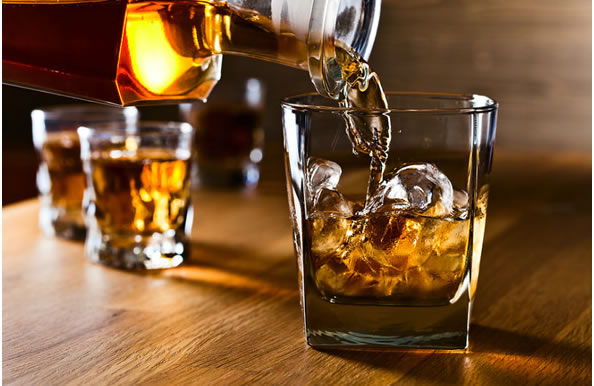
Medical experts have said the reduction in consumption of alcoholic beverages occasioned by hardship in the country is a blessing in disguise as it would reduce the risk of non-communicable diseases among Nigerians.
The physicians said the reduction in alcohol intake among Nigerians will yield positive results to the campaign against alcoholism, which has impacted negatively on people with a history of cardiovascular diseases.
According to the World Health Organisation, non-communicable diseases are a significant health problem in Nigeria, stating that NCDs accounted for 27 per cent of deaths in Nigeria in 2019.
“The age-standardised mortality rate across four major NCDs (Cardiovascular Disease, Chronic Respiratory Disease, Cancer and Diabetes) was 565 per 100, 000 in males and 546 in females in 2021,” WHO stated.
PUNCH Healthwise reports that there has been a reduction in alcohol (beer) consumption among Nigerians due to a hike in prices of the products, which has made them unaffordable to a vast majority, thereby, making them to prioritise food.
The reduction was highlighted in a recent report released by the Nigerian Breweries Plc., where it lamented that the company’s profit margin dropped significantly due to the inability of Nigerians to afford beers occasioned by the sweeping hardship being experienced in the country.
The Chief Executive Officer of NB, Hans Essaadi, on Monday, February 19, 2024, said the economic situation in Nigeria had deteriorated to the extent that citizens could no longer afford to buy beer.
According to him, the company’s investor called following the release of its 2023 results, saying, “It has been an unprecedented year for our business in Nigeria. We saw a significant decline in the mainstream lager market as a result of Nigerian consumers no longer able to afford a Goldberg after a hard day’s work.”
A survey carried out by PUNCH Healthwise revealed that the most sought-after brands of beer taken by middle and low-income drinkers have increased from N400, N500 and N600 to N700, N800, N900 and N1,000 per bottle respectively. This price change is dependent on the place of purchase as prices also differ based on location.
Experts, who spoke exclusively with PUNCH Healthwise in different interviews, said alcohol consumption causes death and disability early in life, noting that in people aged 20 to 39 years, about 13.5 per cent of deaths are attributable to alcohol.
A Professor of Medicine and Endocrinology at the College of Medicine, University of Lagos, Idi-Araba, Lagos, Olufemi Fasanmade, said such reduction is a good development as doctors have been clamouring for the tax to be imposed on alcoholic products to reduce their consumption.
He said, “The reduction in alcohol consumption will help people with certain medical conditions that may be worsened by alcohol such as diabetes, cardiovascular disease, chronic respiratory disease, and cancer. I advise these people to drink water instead. Water is the cheapest and most safe drink.
“Yes, the reduction in alcohol consumption is a blessing in disguise though it would be a bad business for the manufacturers. This is why we have been asking the government to put high taxes on harmful beverages in Nigeria to discourage consumption.
“If the products are expensive, people will look for another pass-time. For average drinkers, yes, high prices can be partially a deterrent.
“So, the number of those that stock alcohol in their houses will reduce. It is a blessing in disguise but from an economic point of view, the companies that produce them would say otherwise.”
Corroborating his views, a Professor of Public Health at the University of Ilorin Teaching Hospital, Kwara State, Tanimola Akande affirmed that the hike in prices of alcohol which drove down the consumption of alcohol by Nigerians is a blessing in disguise.
He said, “The economic crisis leading to a reduction in alcohol consumption has health benefits. Alcohol consumption is related to certain noncommunicable diseases. Therefore, a reduction in alcohol consumption will, to some extent, lead to a reduction in the disease burden attributable to alcohol consumption.”
“Alcohol consumption has been known to increase risky sexual behaviour, which may lead to sexually transmitted infections and unwanted pregnancies. And so, reduction in its consumption would invariably lead to further reduction in these cases.”
According to the US Centre for Disease Control and Prevention, diseases that could be worsened by alcohol consumption include high blood pressure, heart disease, stroke, liver disease, and digestive problems.
Others include cancer of the breast, mouth, throat, oesophagus, voice box, liver, colon, and rectum.
It also weakens the immune system and increases the chances of getting sick.
A 32-year-old bricklayer, Segun Abiola, told our correspondent that the current condition in the country does not allow for extravagant spending.
He said, “Nigeria has turned us into hopeless people and we need to think to survive. This is the time to borrow sense for those who don’t have it. Nigeria has never been this bad to the point that the beer that we drink to calm down and face the struggles of life is no longer available.
“I used to take three bottles of beer everyday while watching football in a view centre but I can’t try it again. I have learnt to sit over a bottle until the match ends. The price of three bottles at N800, which is N2,400, can buy a bottle of groundnut oil to make stew. I have done the calculations and I chose to give myself sense.”
Also, a father of one, Okwundu Francis, said this is not the time to spend money to please people.
He said, “This is not the time you can borrow money from anybody because that person you are borrowing from doesn’t have to. I now respect myself these days.
“Before now, when Ladipo Market in Mushin, where I have a shop closes, I will stay back to drink with friends and even buy for people. But the hardship in Nigeria is now making us to be sensible. Anybody who still spends money recklessly doesn’t love himself because nobody knows what lies ahead for everyone in this country.
“I hardly stop again to drink at those spots. I have reduced my intake of alcohol but that doesn’t mean I will not drink at all. No, I’m now an occasional drinker. It is better to eat than to drink beer on an empty stomach.
“If I buy food, everyone in my family will eat from it but beer takes care of only me and I will still go home to eat food. A bag of rice now costs N81,000 in a country where rice once sold for N9,000 in 2013. It’s not funny, those drinking their future away should continue.”
Also, a single mother of one, Josephine Ogunbunmi said, “I have stopped buying beer. The price has gone beyond me. I have bills to pay. I have a lot that I can do with the N800, which I would use to buy one bottle of beer. It will buy salt, seasonings, spices, packets of sugar and others.
“But that does not mean that I won’t drink again. I will not buy but if someone buys for me, I will drink. There are more pressing things to do with money now. This is the time for us to now practise what we all know as a scale of preference.”





